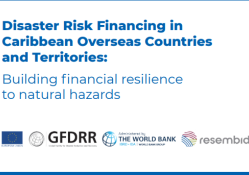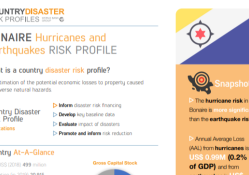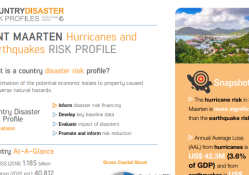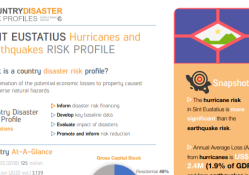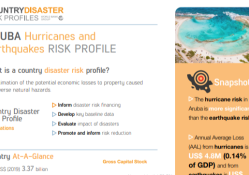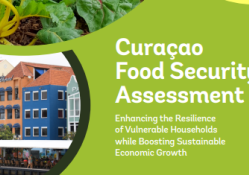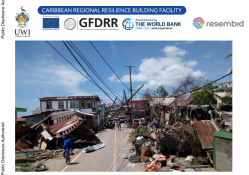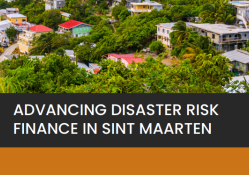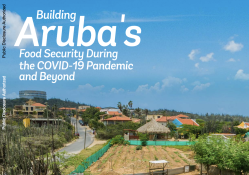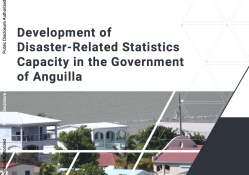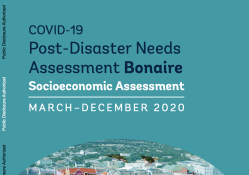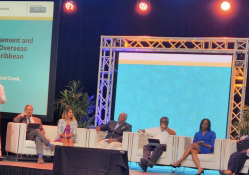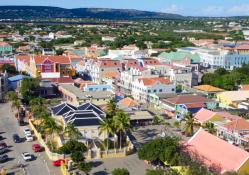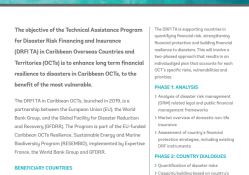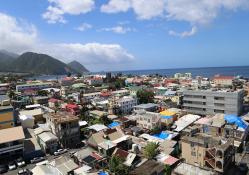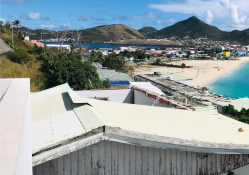The Caribbean Overseas Countries and Territories (OCTs) are vulnerable to extreme climate events such as hurricanes Irma and Maria, which struck in 2017, but also to multiple hazards such as floods, earthquakes, landslides, drought, and volcanic eruptions. The OCTs’ capacity to cope with these events is limited due to their small and undiversified economic bases, which are heavily dependent on their environmental resources and fragile ecosystems.
As they share some of the same economic features as Small Island Developing States (SIDS), the OCTs are confronted by a unique set of challenges which can hinder their ability to financially respond in a timely and appropriate manner to disasters. There is a need to reduce this structural vulnerability and increase the resilience of economic infrastructure and fragile ecosystems to account for these recurring extreme events, which will in turn lead to more sustainable economic development and environmental protection efforts in the Caribbean OCTs.
The European Union and the Caribbean OCTs agreed on a cooperation program under the 11th European Development Fund. Under this framework, the parties agreed that EUR 40 million would be earmarked for the Resilience, Sustainable Energy and Marine Biodiversity Program (RESEMBID). Originally comprising of just two components covering sustainable energy and marine biodiversity, a third component, resilience, was added to fully consider the impacts of hurricanes Irma and Maria on the OCTs’ economy and environment. This reflects the European Union’s development policy which addresses resilience as one of its priorities, highlighting the need to move from crisis containment to anticipation, prevention, and preparedness.
Funded by the European Union

The Technical Assistance Program for Disaster Risk Financing and Insurance in Caribbean Overseas Countries and Territories (OCTs), launched in 2019, is a partnership between the European Union, the World Bank Group, and the Global Facility for Disaster Risk Reduction. The Program is part of the EU-funded Caribbean OCTs Resilience, Sustainable Energy and Marine Biodiversity Program (RESEMBID), implemented by Expertise France, the World Bank and GFDRR.
The objective of this program is to enhance long-term resilience and adaptation capacity in the Caribbean OCTs to adapt to extreme and recurrent natural events, to the benefit of the most vulnerable. Specifically, this is being undertaken by supporting the development of innovative disaster risk financing (DRF) options; capacity building within OCTs on the use of existing risk transfer mechanisms like the Caribbean Catastrophe Risk Insurance Facility (CCRIF); and working with the OCTs to promote informed decision-making on disaster-risk financing.
Activities focus on carrying out gap analyses for DRF, including both financial and policy considerations, and assessing demand for sovereign DRF products; identifying the financial exposure or contingent liability to geophysical and climate-related disasters; and enhancing the understanding of different but complementary disaster risk financing tools, such as indemnity insurance, parametric products, and contingency funds, to help countries manage their fiscal risks related to natural disasters.
Activities also focus on developing feasibility assessments for selected Caribbean OCTs to acquire insurance products offered by the CCRIF. This includes quantifying disaster risk, and facilitating understanding of insurance regulations in each OCT, as well as CCRIF products and coverage. South-south knowledge exchange on DRF products and budget classification will also be conducted, and activities will include simulation exercises, instruction, and role-playing, as well as sharing of successes and challenges. Finally, training activities, in partnership with CCRIF, will be delivered to better understand CCRIF products and services, in particular sovereign parametric insurance mechanisms.
Program activities will cover the following Caribbean OCTs: Anguilla, Aruba, Saint Barthélemy, the British Virgin Islands, Bonaire, the Cayman Islands, Curaçao, Montserrat, Saba, the Turks and Caicos Islands, Sint Eustatius and Sint Maarten.
|
|
The Technical Assistance Program for DRFI in the Caribbean OCTs is managed by the GFDRR secretariat, and activities are implemented by World Bank teams and beneficiary OCTs, in close coordination with EU delegations to Caribbean OCTs and to regional and sub-regional organizations.



